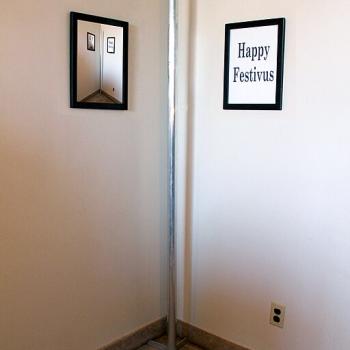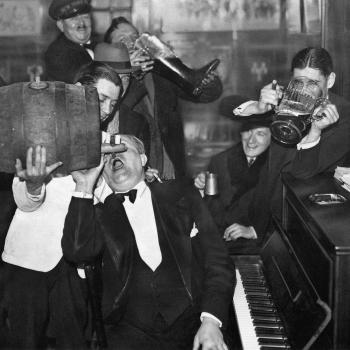Today’s guest post is by Dr. Barry Hankins, professor of history at Baylor University, and author of books including Baptists in America: A History (with Thomas Kidd).
This week the Supreme Court heard oral arguments in Little Sisters of the Poor v. Burwell. The Sisters, joined by many Protestant groups, have challenged the Affordable Care Act’s mandate on birth control. Even though the Obama administration devised a method by which religious organizations would not have to pay for birth control coverage, the religious groups still had to start the bypass process by filing a letter. This, the Sisters have argued, made them complicit in a practice (birth control) the Catholic Church forbids. This is the first religious liberty case the court has heard since the passing of Antonin Scalia. It may very well end in a 4-4 tie, which would leave intact lower court rulings, all but one of which favored the government against the Sisters.
If that happens, conservative Christians are likely to think, “Oh, how we wish Scalia would have been here for this case.” One problem: he was the author of the most notorious decision regarding religious liberty in the past fifty years. And, irony of ironies, the Sisters are appealing to a law that was passed precisely to overturn Scalia’s infamous decision. Oregon v. Smith (1990) was largely overlooked in all the retrospectives and eulogies for Scalia. In the many obituaries and op-eds I read after his death, not a single one mentioned the case. Yet, this was easily the most significant religious liberty decision of Scalia’s career. And it was also the most reviled.
The Smith decision is better remembered as the Peyote case. In the 1980s, Alfred Smith and Galen Black, two members of the Native America Church, were fired from their jobs as drug counselors (of all things) for ingesting the hallucinogenic drug peyote. This was a sacramental practice of their religion, something Native Americans had practiced for centuries. Because they had been fired for violating Oregon’s drug laws, Smith and Black were denied unemployment benefits. They sued, claiming the denial of benefits violated their right to the free exercise of religion.
As the case wound its way through appeals, most religious liberty experts believed Smith and Black would lose at the Supreme Court. At that time, the Court held to a “strict scrutiny” standard whenever law or government regulatory power curtailed religious practice. Moreover, a state needed to show a “compelling interest” whenever its otherwise neutral laws infringed on religious free exercise. This compelling interest test, as it was called, had been developed by the Court in the 1960s as a way of interpreting and applying the free exercise clause of the First Amendment. In other words, because religious freedom is not absolute (you can’t engage in human sacrifice, for example), the court developed the test as a way to gauge when it was permissible to restrict religion.
The common assumption leading up to the Smith decision was that with the “war on drugs” at its height, Oregon would have little difficulty showing a compelling interest for enforcing its drug laws, even when such enforcement restricted the religious practices of a Native American religious group. Many individuals and groups had used the compelling interest test to argue for a religious exemption to various laws. Only two had ever won. In other words, in the vast majority of such cases, the state could show a compelling interest.
This time the Court shocked everyone. Scalia and the four justices who signed on to his majority opinion not only ruled in favor of Oregon and against Smith and Black, but also threw out the compelling interest test in its entirety. Making this doubly surprising, the state of Oregon had not even asked the Court to reconsider compelling interest. Rather, the state’s attorneys seemed quite content to simply pass the test—to show convincingly that Oregon had a compelling interest in enforcing its drug laws.
But Scalia argued that if people, even in theory, could be granted an exemption from an otherwise constitutional law, we were “courting anarchy.” If people believed a particular law violated their religious practices, he continued, they should lobby their legislature for redress rather than asking the courts to grant an exemption. From the Smith decision forward, states no longer needed to show a compelling interest for restricting religion, but merely that a law or regulatory practice was “generally applicable”—that is, not intended specifically to curtail religion.
There followed a hue and cry that united groups across the political and theological spectrum. The Christian Right as well as the secular left joined together in denouncing the decision. The Southern Baptist Convention joined the ACLU, as did virtually every church-state lobby group whether evangelical, liberal Protestant, Catholic, Jewish, or secularist. There was a consensus that the Court had gutted the First Amendment’s free exercise clause, placing religious liberty at the whim of majorities in legislatures.
Congress responded to the uproar by crafting and enacting a law designed specifically to overturn the Supreme Court’s decision. The Religious Freedom Restoration Act (RFRA) passed with a unanimous voice vote in the House and only 3 nay votes in the Senate. President Bill Clinton signed it into law in 1993.
RFRA reinstated the compelling interest test for federal, state, and local governments. Not a body to take a congressional smack down lightly, the Supreme Court responded in Boerne (TX) v. Flores (1997) by striking down the state and local provisions of RFRA but leaving intact the law’s application to the federal government. Many states responded to the Boerne decision by passing their own “mini-RFRA” laws, as they were called.
And all this brings us back to last week’s case Little Sisters of the Poor v. Burwell. The basis of the Sisters’ claim is the compelling interest test embedded in RFRA. If Scalia were alive he likely would side with the Sisters. Not because he was Catholic, but because he believed in deference to legislatures. Oddly, the law to which he would have deferred was passed precisely to overturn a decision he wrote.















